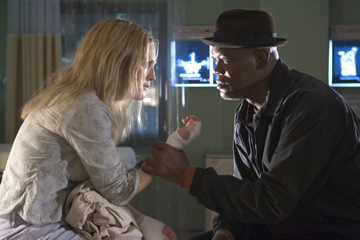 Julianne Moore is interrogated by Samuel L. Jackson in a hospital examination room in ‘Freedomland.’
Julianne Moore is interrogated by Samuel L. Jackson in a hospital examination room in ‘Freedomland.’
|
| Freedomland\r\nStarring Samuel L. Jackson and Julianne Moore. Directed by Joe Roth. Written by Richard Price, based on his own novel. Rated R. |
|
A D V E R T I S E M E N T
|
|
|
|
A D V E R T I S E M E N T
|
|
Oh No, Not My Baby
Powerhouse acting is the reason to hit the road to Freedomland.
By KRISTIAN LIN
When I read Richard Price’s Freedomland 10 years ago, I knew it was a potential home-run ball for Hollywood. In my head I could see the film version of this police procedural overflowing with racial tension and compelling characters, a movie with a pulp thriller’s remorseless pace and an epic’s scope. Then the project was announced a couple of years ago with Joe Roth as director, and my heart sank — the guy behind America’s Sweethearts and Christmas With the Kranks was going to do justice to this? It pleases me now to report that the movie, while falling short of the book’s crushing power, is much better than I feared.
It begins in the poor, crime-infested fictitious town of Dempsy, N.J., a name that’ll be familiar to Price fans. In this black neighborhood, a white woman turns up in a hospital bleeding from her hands. She’s Brenda Martin (Julianne Moore), a semi-employed recovering drug addict from the nearby working-class white suburb of Gannon. She tells the cops about being carjacked by an African-American man, but it’s only when Detective Lorenzo Council (Samuel L. Jackson) presses her that she reveals that the carjacker drove off with her 4-year-old son in the backseat. The case has the impact of a firebomb, as Gannon police impose something like martial law on Dempsy’s residents, who are outraged that the boy has received more attention than any of the black murder victims in their city. As he leads the investigation, Lorenzo is accused by both white cops and black citizens of taking the other side. Worse, Brenda’s story starts to fall apart as soon as she tells it, and even her own brother (Ron Eldard), a Gannon cop, doesn’t believe her.
As screenwriter, Price makes significant changes to his novel, cutting out an entire major character. He fixes a number of plot contrivances, but he adds on a few others and does away with the most endearing quirk in Brenda’s personality, her habit of making mixtapes for her friends that display phenomenal taste in early R&B/soul music. Another mistake: The titular Freedomland is an abandoned orphanage here. In the book it was an abandoned amusement park, which was more poignant, a sign of happier times that a bad neighborhood once enjoyed. His celebrated ear for dialogue isn’t as sharp as usual here, either; Brenda’s early speech about what her son means to her is too polished.
Most damaging of all, Price pulls back on the book’s wrenching tragic ending, though he may not have made the call. It feels as if a scene regarding Brenda’s ultimate fate might have been filmed and then razored out for some reason in the editing room. For his part, Roth doesn’t capture the book’s atmosphere of spiraling tension and violence caused by Brenda’s case; the race riot near the film’s end feels more like an afterthought than a climax. This movie would have been more searing in the hands of someone such as, to make an incredibly obvious choice, Spike Lee (who did his best work adapting Price’s novel Clockers to film in 1995).
Yet the infelicities in the adaptation are overcome by the performances of its high-powered cast. (Give Roth some credit here, too. After indulging in some lame editing tricks in the opening sequences, he mostly stays out of his actors’ way.) An unrecognizably deglamorized Edie Falco plays the leader of an activist organization that searches for missing kids, and she has a mesmerizing showpiece scene in which her character uses a story about her own family to quietly browbeat Brenda until she cracks. Her soothing, gently rhythmic speech pulls you forward in your seat, and Falco’s sotto voce reading of the line “Sweet Christ in Heaven” will give you chills.
Meanwhile the two leads, guilty of coasting through movies in the past, both bring their A-games here. Moore overcomes a shaky start and successfully plays her role as a woman flailing in a fog of grief and guilt. When she gives a confession in a police station late in the film, the mentally fragile Brenda disintegrates before your eyes as her overpoweringly sad story spills forth, and Moore makes it almost too horrible to watch. As for Jackson, he eschews the bombast that comes rather easily to him these days, and the movie needs his calm and authoritative presence at the center of the increasing tumult, even as he registers the trouble brewing around him. Perhaps his best acting comes at the very end, when he reads aloud from a note at a gravesite. The sentiments in the note make for an impossibly bogus way for the movie to conclude, but Jackson’s reading convinced me for a few minutes, and — God help me — even made me tear up.
The movie version of Freedomland isn’t as rewarding as the novel, but maybe that’s the wrong comparison. Place it next to Crash, and you’ll find this movie’s treatment of its black and white characters to be far more complex and humane. The performances by these great actors override the material’s flaws and help give the movie a genuine power that its Oscar-nominated counterpart sorely lacks.
 Email this Article...
Email this Article...

